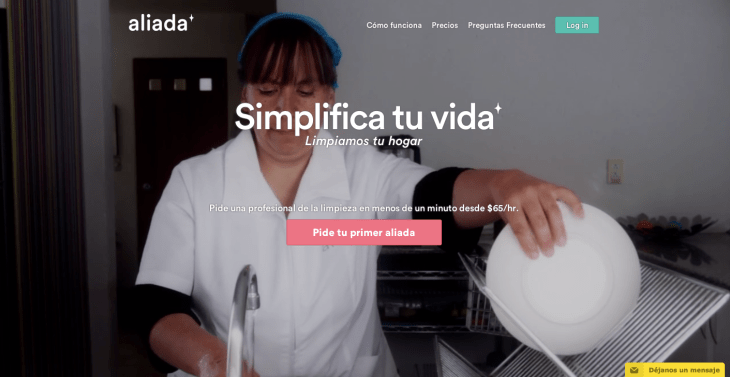Aliada, a housekeeping booking service based in Mexico City, is offering a new, socially responsible model for one of the most maligned segments of the on-demand economy.
The company’s vision has managed to attract attention from some of Mexico’s biggest investment firms. Capital Invent, Variv Capital, and Dila Capital have all committed to Aliada’s $800,000 seed financing as the company looks to increase its presence in Mexico City and expand to other cities across the country.
Bringing the on-demand to housekeeping has meant big dollars for the U.S. startups Homejoy and Handy, which have collected nearly $100 million from venture capitalists between them, and the Rocket Internet brothers have even launched their own emerging market clone, Helpling.
We didn’t want to look for money outside of Mexico, because we want to set an example that amazing things can be done in Mexico by Mexicans. Rodolfo Corcuera
For Aliada founder, Rodolfo Corcuera, it was important to raise capital for his company in his home country. “We didn’t want to look for money outside of Mexico, because we want to set an example that amazing things can be done in Mexico by Mexicans,” Corcuera said.
A former lawyer at White and Case, Corcuera launched Aliada in early September 2014 and the company’s service has now grown to provide 7,500 bookings from roughly 1,000 customers. The company has 162 housekeepers — called Aliadas (the Spanish word for ally) — on staff.
“Before Aliada the situation for housekeepers was tough. In Mexico City, public transportation is complete shit and these women live on the outskirts of the city, which is the biggest in the world,” Corcuera said. “They have to travel four-and-a-half hours a day for work… Now, they can decide the areas they want to work and the time they want to work.”
Corcuera said the system cuts down on travel time for the service providers and they definitely earn more money. “Before people earned 3,500 pesos per month [roughly $233]. Now they can earn up to $1,000 a month.”

In Mexico, Aliada’s biggest competition are the agencias domesticas, which book cleaners for households. The difference is that the agencies typically take an 80% cut of the fees they’re charging to customers, while Aliada only takes 20%.
Benefits of being an Aliada go beyond better wages (although that’s not insignificant). The company also provides healthcare for its service providers through a nonproift called Red de Aliadas, which offers 100,000 pesos in coverage for medical bills.
This is a bridge to become something better… We’re changing the base of the pyramid and by changing the base of the pyramid we can change a country that desperately needs it. Rodolfo Corcuera
Corcuera also has plans to offer more than just health care. Aliadas already receive monthly bonuses and the company will extend food supplements, transportation vouchers and is looking to establish partnerships with high schools and universities for continuing education programs.
“It’s a different model from HomeJoy or others,” says Corcuera. “We want a nexus of demand but we want to make sure we can have an impact on the people we’re actually working with.”
Launching a housekeeping service in Mexico comes with its own unique set of challenges, not least getting potential customers with the fact that they’re letting strangers into their homes.
“Here in Mexico, where the crime rate is higher than in other countries we do very deep background checks,” Corcuera said. In fact, the company currently rejects more than 80% of the applicants for its service, focusing more on the quality of the service providers it brings on board rather than getting a bigger number to boost revenue.
Indeed, many of the company’s housecleaners come from top hotels in Mexico City, where the staff may be looking to cut their commute or put some extra cash in their pocket by working as an Aliada.
The company has its roots in the Venture Institute, a Mexico City-based accelerator focused on startups that have a social justice component to their business plans, or are adding some sort of value to Mexican civil society, according to the organization’s managing partner, Ulrick Noel.
“I realized I could do better than just burning money and have more impact so I decided to find companies that would be doing good by doing well,” said Noel, the former co-chief executive and founder of Rocket Internet in Mexico. “We started to look for companies that would accelerate growth by having a social impact… Companies that will create services and products for people that don’t have it or will enable the people at the base of the economic pyramid.”
Aliada certainly fits that model.
“This is not a cleaning company,” Corcuera said. “This is a bridge to become something better… We’re changing the base of the pyramid and by changing the base of the pyramid we can change a country that desperately needs it.”
